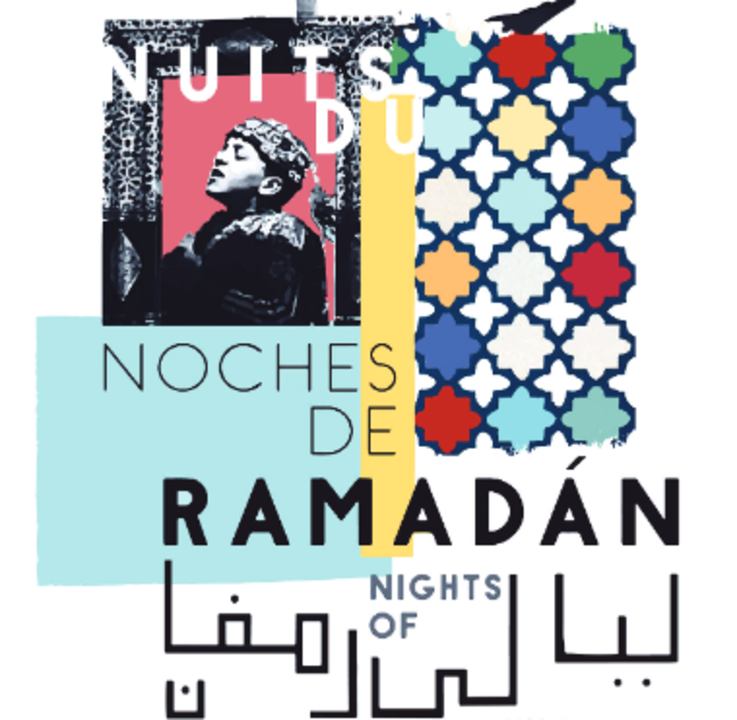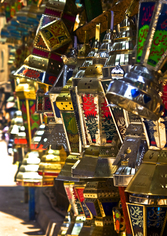Special programs
Index / Activities / Special programs / Nights of Ramadan in Madrid 2016
Nights of Ramadan in Madrid 2016
From June 21, 2016 until July 05, 2016
MADRID
Madrid - Check schedules
The Municipal Government of Madrid has organized a series of activities in different neighborhoods around Madrid as part of the Nights of Ramadan.
Ramadan is the most important month of the year for millions of Muslims around the world. It is time devoted to inner reflection, meeting with family and friends and sharing experiences. In our country, this is the second largest religious community in number of followers, most of whom are Spanish, including more than 200,000 women and men in Madrid. This year of 2016, Ramadan began on June 6 (with variations in certain countries). Laylat al-Qadr, or the “Night of Destiny” will be celebrated on the night of July 2 and the festivity marking the end of Ramadan is on July 6 or 7.
The Nights of Ramadan is a festival that was created in 2006 in the neighborhood of Lavapiés with the goal of promoting integration and cultural cooperation amongst all the people co-existing within the same public space. Throughout its seven editions, it has become a unique meeting point for increasing awareness about the Muslim world’s culture, so present in our shared history. Some of the people are given an opportunity to celebrate their most important festivity of the year, while other locals come to share and learn about the lives of their closest neighbors.
The Municipal Government of Madrid has brought back the Nights of Ramadan once again, making a decisive commitment to diversity and co-existence, with a very special emphasis on the role of culture as a factor for increasing awareness and integration. The activities include the urban and rural, the traditional and contemporary, and are put on by young and veteran performers who have come from other geographical regions. Music, film, dance, circus, literature, exhibitions, workshops, colloquiums... there are activities for all ages, reflecting a rich diversity in art work and thought. At this edition, the Parque Casino La Reina in Lavapiés will continue to be the epicenter of the Nights of Ramadan’s musical events, but the festival will also be taken to many other sites around the city, thanks to the participation and involvement of district cultural centers, a wide range of groups, bookstores, concert halls and institutions like Casa Árabe and the UNED.
From June 21 through July 5, the Nights of Ramadan will therefore become a time for coming closer together and getting a more in-depth awareness of the Muslim world’s culture, to become more familiar and acknowledge others and grow mutually enriched. We invite you to discover the schedule of events we are presenting you here, which ends with a “Glossary of words not to miss during Ramadan,” courtesy of Casa Árabe. When Ramadan comes to an end, our greatest wish will be the same as we always declare during the festivity of Eid al-Fitr: Kul as-sana wa-enta bi-khayr: May the whole year go well for you.
-
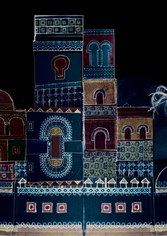 © Jose Alberto López serie “1001 Noches”
© Jose Alberto López serie “1001 Noches”Tales of Al-Andalus From Cordoba to Damascus
June 22, 20167:30 p.m.MADRIDCasa Árabe Auditorium (at Calle Alcalá, 62). 7:30 p.m. Free entry until the event’s capacity is reached.These stories, forming part of the activities during the Nights of Ramadan in Madrid, will be narrated by Jesús Greus and Luis Delgado.“Tales of Al-Andalus” is a show in which stories from ages past are told in the form of a tale that takes us on a journey back to the world evoked by The Arabian Nights.From the amazing gift given by a sultan to a musician for a beautiful song and the daring of a woman sultan in the royal harem. From the hustle and bustle of a bookshop in Cordoba to a play on the chess board which saved the city of Seville. From the nostalgia of one of the court favorites in the lovely citadel of Madinat al-Zahra to the curiosity of Caliph Harun. The voice of Jesús Greus and Arabic oud of Luis Delgado will lead us deep into these tales filled with beauty, imagination and historical accuracy.Jesús GreusBorn in Madrid, Jesús Greus is a writer with a university degree in the English language from London’s Institute of Linguists. He has been a contributor to the newspapers ABC, Diario 16 in the Balearic Islands, El Día del Mundo and Libération du Maroc and currently contributes to various digital literary journals. He has also worked as a translator for publishing firms in Madrid. As a conference speaker, eh has been a guest of the Institut du Monde Arabe in Paris, the Sorbonne University, the Le Monde autour du Livre foundation in Bordeaux, the Center for Luso-Arab Studies in Silves, Portugal, the Fundación Arte y Cultura in Madrid, several different local branches of the Cervantes Institute, cultural foundations in Morocco, etc. He was recently invited to take part in the prestigious Ted Talks organization. He is a musician and has formed part of various groups in the past, performing works of musical fusion, as well as medieval and Renaissance music. He has been a cultural manager for the Cervantes Institute in Marrakesh and is a member of cultural foundations in that city, where he has resided for fifteen years. The author of various film screenplays, he also contributes literary tales to several online journals and has had numerous essays, novels, plays and stories published on this subject.Luis DelgadoA performer and author dedicated to ancient music since 1970, Mr. Delgado has worked in several music groups: Orquesta Gaspar Sanz, the group “Atrium Musicae,” the “Cálamus” ensemble, “Música Antigua” by Eduardo Paniagua, Ibn Baya Spanish-Moroccan Group and the Occitan trio “Le Tre Fontane.” As an author, he has composed soundtracks for television, ballets and various theatrical production, having received the Max Award for his achievements. He has gone on tours throughout the world and regularly composes for the Planetarium in Madrid. He has also worked for those in New York, A Coruña, Cuenca and Pamplona. He has had more than thirty albums published as a solo artist and has taken part in more than fifty recordings as a musician and producer.RepertoireA fabulous gift for a song | The daring of a woman sultan and the royal harem | The popularity of books in Cordoba | The poet and chess | Zahra the favorite’s nostalgia in Madinat al-Zahra | Caliph Harun Rashid’s curiousness -
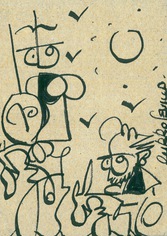 © Curro Sevilla
© Curro SevillaDon Quixote and the Arab World (for children only)
June 28, 20167:00 p.m.MADRIDCasa Árabe Auditorium (at Calle Alcalá, 62). 7:00 p.m. Limited seating. Free entry until the event’s capacity is reached.This show is one of the activities planned for Madrid’s Nights of RamadanTheatrical adaptation of the work “Don Quixote” in classical Arabic. After a brief theatrical warm-up with the children, it is some of the young audience members themselves who will be playing the different characters, always with the help of Marco Magoa and no need for any prior rehearsal. The viewers/actors won’t be familiar with the script, but because of the scenes’ simplicity, it is they who will create the theatrical performance as the play moves along.Marco Magoa is an actor and theatrical director with a great deal of experience (Teatro Margen, La Fura dels Baus, Spain’s National Classical Theater Company, Royal Theater of Madrid, etc). With his dance company “teatro4m,” he has directed and produced twelve productions and has worked in Arab countries for ten years. His trilogy about the drama of the refugees is his most recent work, and his latest production “Mare Nostrum finis somnia vestra” premiered in Copenhagen, Denmark in 2016.Language: The performance will be held in Spanish with some words in ArabicAges: For children from 8-12 years oldDuration: 50 minutes
Organize: Casa Árabe and the Municipal Government of Madrid -
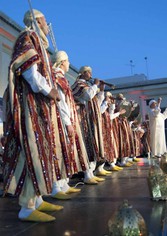
Issawa, a street procession with traditional Moroccan music
June 28, 20168:00 p.m.MADRIDBegins at Casa Árabe (Calle Alcalá, 62) 8:00 p.m.This musical street procession, one of the activities during Madrid’s Nights of Ramadan, will pass through the Retiro Park.Issawa Belkhayat is a group which was formed by Mohamed Belkhayat in Madrid in 2001. Belkhayat is a performer with a lengthy career behind him in his country of origin, Morocco, where he worked with the greats in the Issawa and Hmadcha musical styles. Since it was created, Issawa Belkhayat has appeared at both domestic and foreign festivals.Issawa songs are famous in the Arab world for their spiritual music characterized by the sounds of bagpipes (mizmar, zurna), and the singing of spiritual hymn groups accompanied by an orchestra of percussion instruments with differently shaped drums, the tbal, taarija, bendir and tara.The Issawia community’s musical sources come from the Sufi tradition. The characteristics which define the songs, rhythms and dances of the Issawa tradition are different from other musical styles in Morocco and are mainly inspired by texts which were, in turn, written or inspired by its founder, Sheikh Al-Kamil.The musical procession will begin at 8:00 p.m. in the Casa Árabe garden and will continue inside the Retiro Park with the following path going around the “estanque”: music gazebo (Plaza del Maestro Villa), Fuente de los Galápagos, Fuente de la Alcachofa, Palacio de Velázquez, Monument to Alfonso XII, Plaza del General Martínez Campos, then returning once again to the Casa Árabe headquarters at approximately 9:15 p.m.
Organize:Casa Árabe and the Municipal Government of Madrid -
What is Ramadan? Fasting, festivity and customs
June 29, 2016MADRIDCasa Árabe Auditorium (c/ Alcalá, 62)The Municipal Government of Madrid and Casa Árabe have organized this conference as part of the Nights of Ramadan.This conference will deal with the social and cultural aspects of Ramadan, as well as the basic facets of fasting, one of the five basic pillars of Islam and a regular religious practice in Muslim societies which strengthens the bonds of solidarity and a feeling of belonging to one same community. A period of spiritual awareness, and at the same time a month when the people hold a very special, active place in public space, Ramadan creates a change of pace in the everyday life of believers and the community. On an increasingly widespread basis, many places are also viewing Ramadan as a festival time in which different celebrations during the month and at its end highlight the moral values and spirit of community amongst Muslims while recreating local folk traditions.Araceli González Vázquez has a PhD in History from the University of Cantabria (2010) and a university degree in Social and Cultural Anthropology from the University of Deusto (2004). As of July 1, she will be working as a Juan de la Cierva postdoctoral researcher at the CSIC’s Institute of Mediterranean and Middle Easter Languages and Cultures. She has worked as a postdoctoral researcher at the Laboratoire d’Anthropologie Sociale of the Collège de France (2011-2012) and in the Arab and Islamic Studies Area at the University of the Basque Country/Euskal Herriko Unibertsitatea (UPV-EHU) (2013). From 2014 to 2016, she has been an affiliated member (membre affilié) of the Laboratoire d’Anthropologie Sociale of the Collège de France and has led a research project within the Study of Studies on Ceuta area titled “The Muslim Saints of Ceuta: Religious anthropology of Ceuta’s contemporary Islam.” She is a specialist in gender anthropology and Islam in Morocco, and in her works she deals with topics involving rituals and the body. She is the author of the book Mujeres, Islam y alteridades en el norte de Marruecos (Women, Islam and Othernesses in Northern Morocco, Barcelona, Edicions Bellaterra, 2015).
Organize:Municipal Government of Madrid

